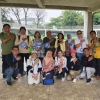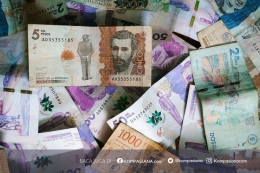Prof. Rokhmin Dahuri, MS
Head of the Maritime and Fisheries Affairs in the Indonesia Democratic Party of Struggle (PDI-P), Advisor to Minister of Marine Affairs and Fisheries (2019 -- 2024), and a former Minister of Marine Affairs and Fisheries (2001 -- 2004)
*Artikel Ini telah terbit pada Koran JakartaPost Edisi 17 Juli 2021.
All Indonesian citizens have long been aspiring for the materialization of the nation's indpendence goal that is a developed, prosperous, and soverign country. Despite improvement in almost all aspects of human life since its independence in 1945, the development status of Indonesia in 2019 was still as an upper-middle income country with GNI (Gross National Income) per capita US$ 4,050.
A country classified as an upper-middle income, when its GNI per capita is in the range of US$ 4,046 and US$ 12,535 (World Bank, 2020). While prosperous (high-income) countries are those with GNI per capita higher than US$ 12,695 (World Bank, 2021). Unfortunately, due to the COVID-19 pandemic, the country's development status falls back into a lower-middle income country with GNI per capita US$ 3,870. Indonesia is also still confronted with myriad development problems such as high poverty rate, income inequality, stunting growth, and a skewed regional development.
To escape from the middle-income trap, and become a developed and prosperous country with GNP per capita higher than US$ 12,695 by 2035 and US$ 27,500 by 2045, Indonesia's average economic growth must be bigger than 7 percent per year (Mc Kinsey Global Institute, 2020). In addition, the economic growth must be able to create more employment opportunities, and can be enjoyed by all Indonesian people on a fair and sustainable basis. It is also imperative to spread out new sources of economic growth and development activities to outside Java Island and rural areas, particularly in eastern part of the country.
Blue economy potential
Basically, blue economy means the use of coastal and marine ecosystems including their embodied natural resources and environmental services for sustainable economic development (UNEP, 2013). Natural resources within coastal and ocean space consist of renewable resources (e.g. mangroves, seagrasses, coral reefs, fish stocks, and ocean energy), and non-renewable resources such as oil, gas, minerals, and mining materials. Environmental services include the use of coasts, seas, and oceans for martitime transportation, recreation and tourism, assimilation of wastes, carbon sink, climate regulator, hydrological cycle, and other life-supporting functions.
As the largest archipelagic country on earth, three quarter of its area covered by marine waters with 17,504 islands and 99,200 km coastline, Indonesia has a huge blue economy potential. Such a gigantic economic potential can be utilized for the nation's economic development and prosperity through eleven sectors: (1) capture fisheries, (2) aquaculture, (3) fish processing industry, (4) marine biotechnology industry, (5) energy and mineral resources, (6) coastal and marine tourism, (7) maritime transportation, (8) coastal forestry, (9) small islands, (10) maritime industry and services, and (11) non-conventional resources such as ocean energy, deep sea mining, deep sea fisheries, and offshore aquaculture. It is estimated that the total potential value of RI's blue economy is US$ 1.4 trillion per annum (CCMRS, IPB University, 2018), almost 1.5 the country's GDP. Those eleven blue economic sectors may create employment opportunities for some 45 million workers. Moreover, about 45 percent of the world's commodities and products traded with total value of US$ 15 trillion per year have been transported through Indonesian seas (UNCTAD, 2014).
Last year, blue economy sectors including capture fisheries, aquaculture, energy and mineral resources, marine tourism, sea transportation, and maritime industries and services contributed about 20 percent to the country's GDP and employed more than 20 million people. Since 2009 Indonesia has been the second biggest producer of fish and fisheries products in the world, just after China. In 2019 Indonesia produced 23 million fishery commodities, about 2 million tons (US$ 5.2 billion) were exported and 21 million consumed domestically. Since the 1970s some 65 percent of RI's total oil and gas production have been tapped from reserves located in coastal and offshore areas.
Those tangible economic contributions are just one measure of the value of the nation's coasts and oceans. There are many even more important functions and values that can not be given a price tag, such as global climate control, life-support functions, cultural heritage, and the aesthetic value of the coasts and oceans with its intrinsic power to relax, rejuvenate, and inspire. Indonesian coasts and seas host the largest biological diversity on earth with huge potential for pharmaceutical products, cosmetics, biofuel, and raw materials for many other industries; and are a frontier for exciting exploration, research, and education.









